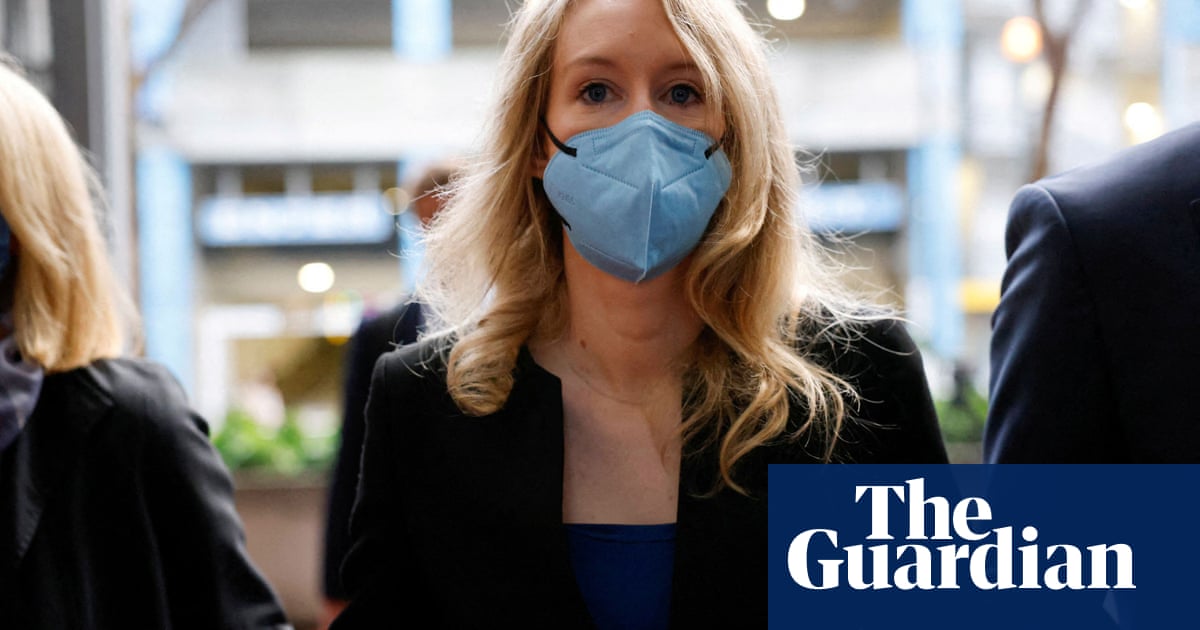Fallen Silicon Valley star faces up to 20 years in prison for 11 charges of defrauding investors and consumers
Thu 16 Dec 2021 13.46 EST
Prosecutors laid out their closing arguments in the trial of Elizabeth Holmes on Thursday, painting the picture of a founder who chose “fraud over failure” and calling the story of Theranos a “tragedy”.
Prosecutors wrapped their closing arguments and the defense made it through several hours of their own before court broke for the day. The face-off caps dramatic proceedings that has stretched over 15 weeks.
On Friday, prosecution will have the opportunity to present a rebuttal before the case goes to jurors in the coming days. Holmes faces up to 20 years in prison and has pleaded not guilty.
The fallen Silicon Valley star faces 11 charges of defrauding investors and consumers over her technology, which she claimed could carry out hundreds of tests using just a single drop of blood.
Prosecutor Jeff Schenk presented to the jury a recap of arguments that Holmes knowingly lied about the capabilities of Theranos testing, saying the evidence shows “she made the decision to defraud her investors and then to defraud her patients”.
“She chose fraud over business failure. She choose to be dishonest with investors and patients,” he said. “That choice was not only callous, it was criminal.”
Schenk cycled through a PowerPoint presentation recapping all 29 witnesses the prosecution has called during the trial, reiterating the claims made in their testimony. He also re-shared transcripts and recordings of allegedly incriminating statements from Holmes, deconstructing her defense point by point.
He said Holmes oversold the capabilities of Theranos technology to attract investors, advertised inflated revenue projections and made false statements to recruit patients.
Schenk said that Holmes was repeatedly told by internal lab workers, her own brother, and by her former lover and business partner Sunny Balwani of problems with the technology – but ignored them.
“The story of Theranos is, in some ways, a tragedy,” he said. “What happened to the investors and the patients should not have happened. They should have been treated with honesty.”
Defense attorney Kevin Downey explained in closing arguments to the jury the high burden of proof it has to find Holmes guilty “beyond a reasonable doubt”.
He presented slides to the jury refuting evidence from the prosecution, in particular stating that its focus on whether Holmes illicitly photoshopped logos of pharmaceutical firms onto reports shared with investors was “a distraction”.
“I ask you to wait and hear the whole story and go through the evidence with me,” he said. “The picture can change a good deal as a result of waiting for the full story and looking through the full material.”
Holmes, meanwhile, sat silently in the courtroom, surrounded by friends, family members, and the family of her partner Billy Evans.
The trial chronicled missteps in Holmes’s 15-year reign as CEO of Theranos, a blood-testing startup she founded after dropping out of Stanford University when she was just 19.
Holmes, now 37, offered a compelling promise. Instead of relying on vials of blood drawn from veins, Theranos touted a technology that Holmes said would be able to scan for hundreds of diseases and other potential problems with a few drops of blood taken via a finger prick.
Theranos wooed billionaire investors while assembling a board of directors that included former US cabinet members spanning from the Nixon to Trump administrations. It raised more than $900m, struck partnerships with major retailers Walgreens and Safeway and turned Elizabeth Holmes into a Silicon Valley sensation with an estimated fortune of $4.5bn.
But unknown to most people outside Theranos, the company’s blood-testing technology was flawed, often producing inaccurate results that could have endangered the lives of patients who took the tests at Walgreens stores.
The problems, exposed in 2015 and 2016 by stories in the Wall Street Journal and the findings of a regulatory audit, led to Theranos’s collapse in 2018. That, in turn, triggered felony charges against Holmes.
Government prosecutors have painted Holmes as a charlatan who duped investors, business partners and patients in pursuit of fame and fortune while positioning herself as a visionary similar to her hero Steve Jobs, the co-founder of Apple. Holmes’s lawyers have depicted her as a trailblazer who took a few wrong turns while running Theranos, but never committed any crimes.
In seven days on the stand, Holmes expressed some contrition while insisting she never stopped trying to refine Theranos’s technology. She also blamed Balwani for many of the company’s problems while accusing him of mental, emotional and sexual abuse that she said turned her into his pawn.
Balwani, Theranos’s chief operating officer from 2009 until Holmes ousted him in 2016, faces similar criminal charges in a separate trial scheduled to begin early next year. His attorney has adamantly denied Holmes’s allegations.
Schenk in his closing arguments told jurors not to be swayed by the evidence of abuse.
“You do not need to decide whether that abuse happened to reach your verdict,” he said.
The Associated Press contributed to this report.
{{topLeft}}
{{bottomLeft}}
{{topRight}}
{{bottomRight}}
{{/ticker}}
{{heading}}
{{#paragraphs}}
{{.}}
{{/paragraphs}}{{highlightedText}}
{{#choiceCards}}{{/choiceCards}}
